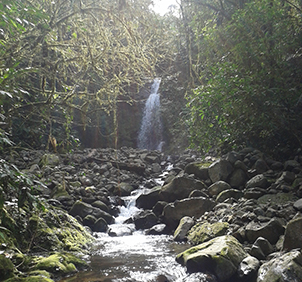Can hydrological drought be efficiently predicted by conceptual rainfall-runoff models with global data products?
Main Article Content
Abstract
The seasonally-dry tropics of northern Costa Rica are characterized by recurrent drought events with negative socio-economic impacts on a vulnerable population. Scarce hydroclimatic observational data constraints reasonable water management and often results in water scarcity issues.
This study analyses hydrological drought situations using freely available Global Precipitation Products (GPP) and a Regional Climate Model (RCM) that drive a relatively simple, semi-distributed rainfall-runoff model (HBV-Light). Firstly, the GPP and observed rainfall were used to calibrate the model simulating streamflow dynamics. Secondly, drought detection and estimates of drought duration, intensity and severity were determined with a daily variable threshold approach. Thirdly, we developed future hydrological drought scenarios based on a RCM. Generally, the GPP CHIRPS (Climate Hazards Group InfraRed Precipitation with Station Data) resulted in the best streamflow simulations (KGE > 0.6) compared with the model driven by observed rainfall (KGE > 0.7). CHIRPS also correctly identified the observed streamflow drought periods of 1994, 1997-1998 and 2001-2002.
Average observed streamflow drought severity was 27.9 mm compared to the CHIRPS-derived severity of 20.6 mm (error estimate of ±7.3 mm). The model in combination with global data can be successfully used to identify drought periods and their duration, but model uncertainty currently prevents from forecasting streamflow deficit with volume errors below 50%. The future hydrological drought scenario showed more severe drought periods between 2039-2041 and 2042-2043.
This study responds to the need for drought assessments in the seasonally-dry tropics with scarce observations as a tool for adaptation to climate change and water resource management.
Article Details
Issue
Section

This work is licensed under a Creative Commons Attribution-NonCommercial-NoDerivatives 4.0 International License.

